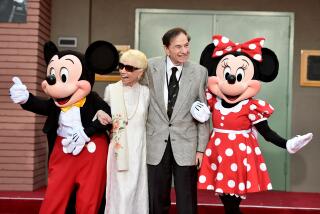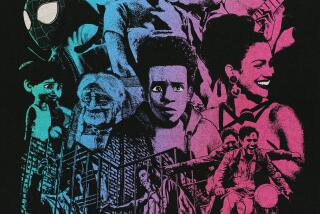COMMENTARY : ‘SONG’ NOT ENDED FOR DISNEY
- Share via
By the latest account, Walt Disney’s “Song of the South” has grossed about $16 million in its 40th-anniversary release this year, playing to millions of children across the country.
But who could take an accurate account of the social and psychological damage done by the racial stereotypes and sentimental inaccuracies contained in this cinematic relic? The portrayal of happy-go-lucky blacks, well nurtured on Southern plantations by benevolent whites, was already outdated when the film was first released in 1946. Four decades of racial progress have seemingly gone unrecognized.
“Song of the South” was the fulfillment of Walt Disney’s childhood dream to bring the Uncle Remus tales, written by Joel Chandler Harris, to the screen, according to a Disney press release.
Like Harris’ original tales, “Song of the South” suffers from a split between the original black material and the Old South myths tattooed onto it by its later white interpreters.
The Uncle Remus tales, which focus on the exploits of a trickster called Brer Rabbit, are among the earliest examples of black oral narration in American literature. As the framing device for the tales, Harris invented the sympathetic bard Uncle Remus, whose fables help a young boy solve his problems. The Disney film continues Harris’ method of interpreting and rewriting a black narrative.
When first released, “Song of the South” refined Disney’s technique of mixing live action with animation. During most of the film, however, live actors and animation are separate. The animated Brer Rabbit material, to which few have objected, accounts for only 30% of the film. “Song of the South’s” damage comes in the remaining 70%, a highly seductive yet ultimately controversial portrait of the South in which Uncle Remus tells his tales.
In 1946, filmgoers were outraged--having mistakenly assumed that Hollywood had outgrown the demeaning prewar stereotypes and had finally repudiated the idyllic version of Southern master-servant relations. At the film’s New York premiere in Times Square, dozens of black and white pickets chanted, “We fought for Uncle Sam, not Uncle Tom.” The National Assn. for the Advancement of Colored People called for a total boycott of the film; the National Negro Congress called on blacks to “run the picture out of the area.” Even such Disney partisans as Bosley Crowther of the New York Times chastised it as a “sublimely unreconstructed fancy of the Old South . . . with the Negroes bowing and scraping and singing spirituals in the night.”
Disney Studios had moments of indecision about reissuing the film. According to the trade paper Variety, the studio announced in 1970 that “Song of the South” had been “permanently” withdrawn from circulation. But two years later, it was re-released. It was reissued again in 1980. A Disney official said “Song of the South” is now part of the studio’s classics reissue program, along with such films as “Sleeping Beauty,” “101 Dalmatians” and “Fantasia,” each of which is re-released for new generations of children about every seven years. The film’s most recent run, which started in October, was met with no organized opposition and the studio apparently received little criticism for its decision. In continuing to reissue “Song of the South,” however, Disney perpetuates myths of plantation life (kind master, contented servant, pastoral harmony) that had been convincingly exposed and rejected well before 1946.
The implicit and explicit untruths of “Song of the South” are made to seem both comforting and entertaining. In this respect, the film resembles “The Birth of a Nation” and “Gone With the Wind,” in which movie magic blinds the audience to historical deceptions. (In 1946, the Atlanta Journal’s film critic rated the film alongside “Gone With the Wind” in its depiction of the South.)
In perhaps “Song of the South’s” strangest and most memorable moment, Uncle Remus sings “Zip-a-Dee-Doo-Dah,” the song that won the film’s only Academy Award. The zest and vigor of the song are the ventriloquism of a white songwriter. We almost forget that the true songs of the South were defenses against beleaguering oppression.
The final irony of “Song of the South” is that Disney has missed or, at best, sanitized the main points of Uncle Remus’ parables. The Africa-derived tales that Harris transcribed on his Georgia plantation in the 1880s allowed the real plantation blacks to escape the humiliation inflicted on them by the plantation system. Brer Rabbit may seem gullible--like Disney’s plantation blacks--but this guise helps him survive. While Uncle Remus may seem like the “heartwarming . . . wise and benevolent plantation philosopher” that Disney publicity calls him, he at least has learned cunning from the tales that he tells.
During his lifetime, Walt Disney took pride in his films chronicling Americans who achieve praiseworthy ends against insuperable obstacles. It would be gratifying to see Disney studios release a remade “Song of the South” featuring a black character fighting for heroic goals.
The “Song of the South II” that my children must one day see will depict a far more accurate “Song” in a far less fictitious “South.”
More to Read
Only good movies
Get the Indie Focus newsletter, Mark Olsen's weekly guide to the world of cinema.
You may occasionally receive promotional content from the Los Angeles Times.










